

Laos education gets boost from Village Science project - SciDev.Net South-East Asia & Pacific. Many people around the world take for granted the availability of educational tools and materials online and that quality educational resources can be found with just a few clicks of the mouse.

In Laos, however, Internet access is not readily available and remains one of the missing links in achieving a more engaging learning environment that fosters creativity and exploration. The Chinese Generation’s Social Context: 6 Big Shifts. There are six major social shifts in Chinese society that will make all of China’s generations dynamic for the foreseeable future.

These shifts are creating fault lines in the Chinese social landscape and rapid change in the values and attitudes within each of China’s generations. Yet, overall social change will unfold in uneven and surprising ways. Adoption of new ideas and identities will require difficult mindset shifts for every Chinese person, and will impact each generation at different rates and times. Why China is having trouble getting the whole country to speak Mandarin - Quartz. After over a century of promoting Mandarin as the official language of China, almost a third of the population still doesn’t speak what the government calls putonghua or the “common tongue.”
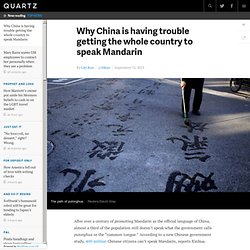
According to a new Chinese government study, 400 million Chinese citizens can’t speak Mandarin, reports Xinhua. Over 90% of the population is Han Chinese, but Han Chinese speak some 1,500 dialects. City plan will grant migrants benefits. Updated: 2013-06-20 02:05 By Zhou Wenting in Shanghai (China Daily)
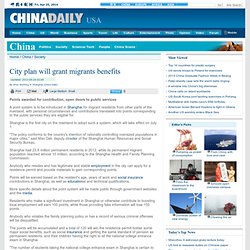
Where some see overpopulation, a plan to attract more people. HONG KONG -- As is the case in many places around the world, the Hong Kong government has sounded alarm bells about the city’s serious problem of a rapidly aging population, urgently calling for a strategic population policy to face the crisis.

The proposed solutions would attempt to increase the birth rate and promote immigration using financial and other incentives. But the idea of having more people come here, while perhaps rationally sound, is not always greeted with enthusiasm. In the tightly packed city, a squeeze on resources in recent years -- ranging from housing to school places --and a frustratingly crowded living environment have led to a growing sense of embitterment over an influx of tourists and immigrants, namely those from mainland China, whose citizens have increasingly been permitted to enter the semiautonomous region of Hong Kong over the past decade.
“A population cap would only compound, not resolve, the population challenges we are facing,” the statement read. China to invest $1 trillion in Africa through 2025. Africa is the world's fastest growing continent. With a projected average growth rate of 6 percent from 2013-2015 and one-third of African countries with economic growth rates currently above 6 percent, the African Development Bank says that Africa is now the fastest growing continent in the world.
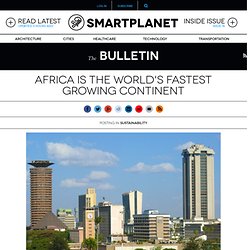
Why China is investing $5 billion in Kenya's infrastructure. China invests $1.1 billion in Nigerian infrastructure. Less than two weeks ago, U.S.
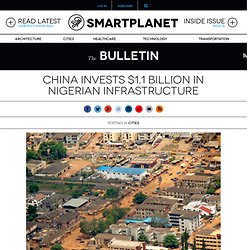
President Barack Obama traveled to Africa where he announced a $7 billion energy plan and welcomed development competition on the continent. “I want everybody playing in Africa,” he said. And it didn't take long for China to show that it's playing, and winning. China's massive foreign investment, in one map. China's plan to build 'Africa's New York City' China's continuing with major investments in Africa.
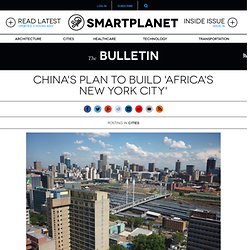
The latest: an ambitious, nearly $8 billion redevelopment project to turn a suburb in the South African capital of Johannesburg into Africa's New York City. Chinese development company Shanghai Zendai Property (based in Hong Kong) said earlier this week that it's planning to turn Modderfontein, a manufacturing hub in eastern Johannesburg, into a major African hub over the next 15 years. “It will become the future capital of the whole of Africa,” said Shanghai Zendai Chairman Dai Zhikang at a press conference, according to Bloomberg. “This will be on par with cities like New York in America or Hong Kong in the Far East.” The nearly 4,000 acre project will consist of 35,000 houses, a sport stadium, and an educational center. As Quartz points out, the project will be a shift from other Chinese investments in Africa which have generally revolved around gaining access to natural resources.
Read more: Bloomberg. Bridging Asia: China or India - Who will be ahead in 2030? China drives record quarter for smartphones. The smartphone market continues to see strong growth globally, with China one of the fastest growing markets.

In the third quarter of 2013, the worldwide smartphone market grew 38.8 percent compared to 3Q 2012, according to a new report from the International Data Corporation. In addition to strong growth, the latest quarter set a new record for total shipments with vendors shipping 258.4 million smartphones. With costs falling for smartphones, China is driving much of the recent growth. China Pushes Back Against Growing U.S. Influence in East Asia - Elizabeth Economy. American outreach to China's neighbors has Beijing on the defensive World leaders pose for the family photo at the Asia-Pacific Economic Cooperation Summit in Honolulu, Hawaii / Reuters Now that President Obama has completed his victory lap in Asia and is safely ensconced--or is that mired?
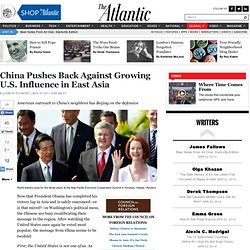
--in Washington's political mess, the Chinese are busy recalibrating their message to the region. After watching the United States once again be voted most popular, the message from China seems to be twofold: First, the United States is not one of us. Second, we have more money, so you should be friends with us instead (or, by the way, you'll be sorry). China’s tech giants bet on mobile e-commerce.
China's two tech giants are banking on consumers shifting their shopping habits away from brick-and-mortar stores and towards online purchases made via their smartphones. Alibaba Group Holding Ltd. and Tencent Holdings Ltd., the nation's two largest tech companies, are investing in location-based services to target consumers with ads based on their whereabouts or to help them comparison shop on their smartphones, reported the WSJ. Alibaba has invested more than $800 million in the past month into the microblog Weibo and online mapping company AutoNavi Holdings, while Tencent has floated plans to use its WeChat messaging application as a way to target shoppers based on their location, reported the WSJ.
Mobile phones lifting the world’s economies: report. The proliferation and adoption of mobile phones is having a tangible and measurable impact on the growth of many of the world's national and regional economies. These devices are the lever that is lifting the world. A new study estimates that a doubling of mobile data use leads to an increase of 0.5 percentage points in the GDP per capita growth rate across selected 14 countries, and that countries with higher level of data usage per 3G connections have seen increases in GDP per capita growth exceeding a percentage point. These findings come from an assessment just released by the GSM Association and Deloitte, which looked at the incremental benefits of next-generation mobile telephony services, such as 3G technology and mobile data services, and their impact on economic growth.
From 'made in China' to 'sold in China': The rise of the Chinese urban consumer. As China transitions to a more consumption-led economy, Chinese incomes will grow and a massive middle class is expected to emerge. Interactive exhibit See how the demographics of the Chinese consumer are expected to change over the next 20 years. Pop out The urban consumer markets, in particular, will develop rapidly, moving from 43 percent of the population today, to 69 percent by 2015, and 76 percent by 2025.
Most important, this urban phenomenon will spread beyond China’s large wealthy coastal cities, to smaller cities further inland. Air pollution costs China $112 billion. As China's cities get bigger, MIT researchers found that the costs linked to air pollution are also dramatically increasing. As China's cities dramatically grow, the country's health costs from air pollution are also increasing rapidly. A new study from MIT found that air pollution cost the Chinese economy $112 billion in 2005, a significant increase from the $22 billion that air pollution cost the country in 1975.
Specifically, the study calculated the health costs and the resulting lost productivity caused by air pollution. Chinese Internet Users Scream for Clean Air Act as Pollution Returns - China Real Time Report. China’s entrepreneurs tap pollution control market. Chinese using smartphones to manage air pollution.